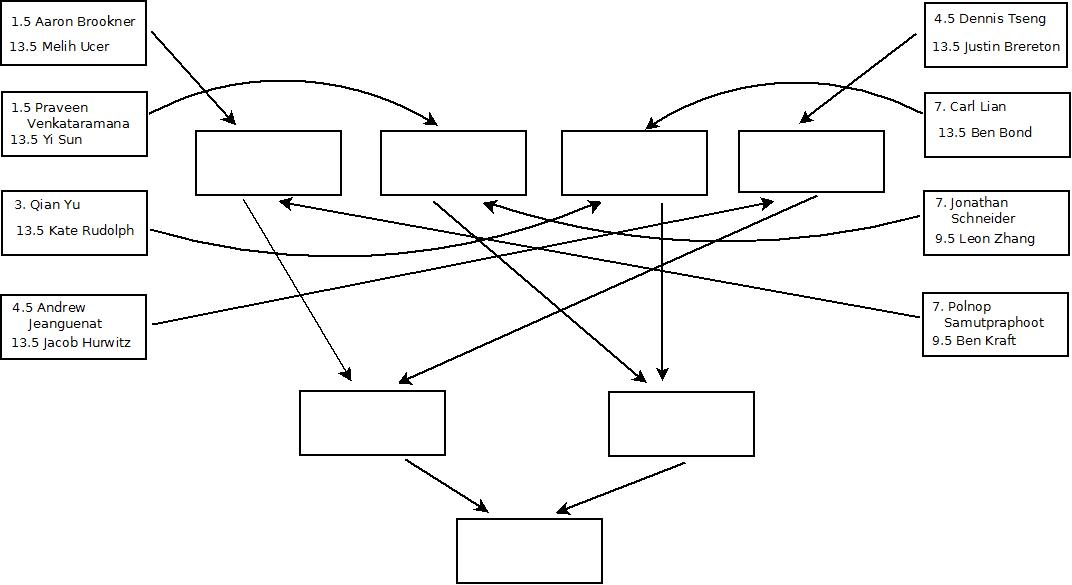The MIT Integration Bee, 2012
This is the webpage for the 2012 Integration Bee. If you are looking for this year's (2013) Integration Bee, please follow this link.
Qualifying round: Friday, Jan 13, 2011 (20 minutes within 4pm -- 6pm) in room 4-149
Main event: Tuesday, Jan 17, 2011 6:30pm -- 9pm in room 10-250
Integration is one of the core constructions in modern mathematics. It is attached to famous names such as Newton, Leibnitz, Riemann, Lebesgue, Stieltjes, Wiener, Itô, Stratonovich, Skorohod, and many others. By definition, the integral of a (nice) function is the area of the region bounded below the graph of that function. The Fundamental Theorem of Calculus (the cornerstone of calculus, as taught, for example, in 18.01) allows the calculation of integrals using another key calculus ingredient - differentiation - in reverse. While differentiation is completely routine, applying it backward to integrate requires skill and creativity.
For many years (though probably less than 128), MIT has held the world's most prestigious (and first) Integration Bee. The format has varied, ranging from a traditional round-robin to an NHL-style playoff tournament. Each year the bee draws a large crowd. Come cheer on MIT's best
speed-integration specialists, and watch them vie for the coveted title Grand Integrator!
The qualifying round
The qualifying round will consist of a written test of 25 integrals, for which participants will have 20 minutes. You can drop by for 20 minutes between 4 and 6 pm. The winners of this round will be finalists in the main tournament.
This year's finalists, ranked in order of their performance on the qualifying test, are:
- Aaron Brookner
- Praveen Venkataramana
- Qian Yu
- Andrew Jeanguenat
- Dennis Tseng
- Carl Lian
- Polnop Samutpraphoot
- Jonathan Schneider
- Benjamin Kraft
- Leon Zhang
- Ben Bond
- Justin Brereton
- Jacob Hurwitz
- Kate Rudolph
- Yi Sun
- Melih Ucer
(There are some ties: see the diagram below)
Update: Here are the questions and answers for the qualifying round.
The Tournament
The integration bee is a four round seeded tournament, with pairing progression detailed on the diagram below.
The first round will be a first-to-two-integrals elimination: the first to solve two integrals correctly will proceed
to the second round, while the other is eliminated. In all rounds, the integrals will be projected onto the screen along with the timer.
In the second round, the first round winners compete in first-to-two-integrals elimination. The
four successful competitors proceed to round 3, which is a
first-to-three-integrals elimination. The two remaining competitors
then square off in the championship round, where the first to correctly
solve 3 integrals will be declared the Grand Integrator!
The integrals will become slightly more challenging as the contest progresses
to higher rounds. All integrals in any given round
will be at approximately the same level of difficulty, none
trivial. The time allotted for these integrals will be: 1 minute each for the
first round, 2 minutes each for the second round, 3 minutes each for the third round,
and 4 minutes each for the final round. If neither contestant gives a correct solution
within the allotted time, both
start with a new integral. When a competitor circles a solution,
the clock is stopped, and the judges consider it. If it is judged
correct, the competitor has won an integral point; if incorrect, the clock
is started again, and either competitor may present a solution within
regulation time. (A competitor may not present more than 2 solutions for
one integral.)

Here are some fun integrals from last year's tournament.

Prizes
The final eight will receive gift certificates to Toscanini's ice cream. The final two competitors will receive book prizes, and the winner of the championship round will be crowned Grand Integrator.
Update
The Grand Integrator this year is Justin Brereton. The runner-up is Praveen Venkataramana.
Thanks to Sriram Krishnan for co-organizing the Bee with me this year (and to the MIT math department for sponsoring it, the prizes and advertising).
This year's contest was covered by the Boston Globe. Here is the link to their article.
|

